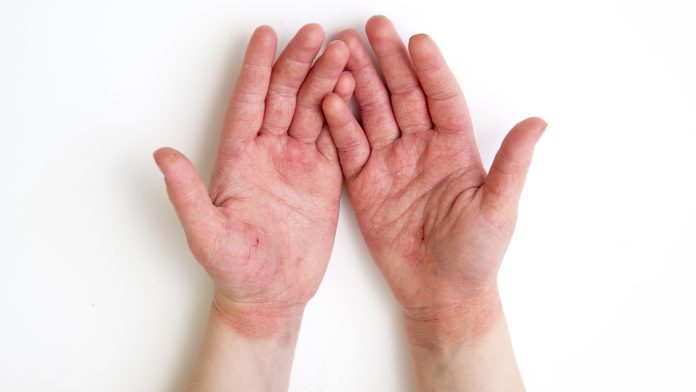
Health Europa speaks to Dr Peter Lio, clinical assistant professor of dermatology and paediatrics, about whether dietary changes can mitigate eczema symptoms.
As the largest organ of the human body, our skin provides an essential barrier against infection. However, dry skin conditions like eczema often mean the skin’s barrier becomes compromised, leaving it susceptible to inflammation and irritation. Also known as atopic dermatitis, eczema symptoms can manifest in various ways depending on its severity. Those with mild cases of the condition may experience, dry, cracked and itchy skin while more severe cases can experience weeping, crusting and bleeding. Though the condition is most commonly seen in infants, one in 10 adults will experience eczema symptoms during their lifetime, and for many, this can have a dramatic impact on their life, affecting sleep, mental health and impetus to complete day to day tasks or hobbies. Indeed, a study published in January 2020 in The Journal of Allergy and Clinical Immunology: In Practice which looked at medical records of more than 500,000 adults with atopic eczema and 2.5 million adults without a skin condition, revealed those with eczema were 14% more likely to develop depression and 17% more likely to develop anxiety.
Although there is currently no cure for eczema, recent research has shed new light on the impact that diet and lifestyle can have on our overall skin health and eczema symptoms. Peter Lio, MD, is a clinical assistant professor of dermatology and paediatrics at Northwestern University’s Feinberg School of Medicine and the director of the Chicago Integrative Eczema Center. He has written extensively on the potential triggers and treatments for eczema, including how the condition is linked to our gut health. Health Europa spoke to Dr Lio about ways in which the foods we eat could impact inflammatory skin conditions like eczema.
How much of an impact do gut health and diet have on eczema? What is known about the correlation between leaky gut and eczema symptoms?
These are exciting questions, and they are questions that we are still learning about. The connection between diet and eczema symptoms is complex and truly varies between person to person, so that means that there is not even a single answer here. It is clear that true food allergies (those mediated by Immunoglobulin E [IgE] and can cause urticaria, angioedema, and even anaphylaxis) are much more common in patients with eczema. In the past several years, a very compelling mechanism for this has been described: it is thought that, in contradistinction to what many people thought previously, the damaged skin barrier in eczema (or ‘leaky skin’ as I like to call it) can actually allow for transcutaneous penetration of allergens – including food allergens like peanut – and actually lead to food allergy. Additionally, we now understand that the health of the gut often seems to reflect the health of the skin, and indeed, there are studies that suggest abnormalities in gut health are predictive of developing atopic dermatitis. Moreover, there is some evidence that improving the gut barrier may have a positive effect on eczema.

Independently, we understand that a healthy microbiome depends on a number of factors including a healthy diet. Some foods may themselves contribute to pro-inflammatory states in both the gut and the skin, further complicating this important area.
Are there particular food groups that could exacerbate inflammation? How would you recommend patients monitor potential food intolerances or allergies?
Yes, we really do think there is quite a range of food reactions, from true IgE-mediated allergy to intolerances such as being lactose-intolerant, to simply being pro- (or anti-) inflammatory. Part of the trouble is that these foods can be highly individualised, and we see so many families try empiric exclusion diets, often starting with excluding gluten and dairy from the diet. The issue here is that, especially for children, making dramatic dietary changes can be very stressful and ultimately may be unsuccessful. Moreover, there is now compelling evidence that excluding foods from the diet that one has been previously tolerating may actually cause loss of that tolerance and development of sensitisation leading to true allergy to that food! This is a disastrous outcome for patients and families.
So, what to do? First, it is important to get a good allergist to help us understand if there are true IgE-mediated allergies that need to be managed. Next, it is important to do our best to get the skin better using conventional approaches. Many times, it can be nearly impossible to tell if a food or foods is making things worse because the skin is so bad to begin with. By clearing things up, it can suddenly become feasible to even start to examine this question. I am happy to report that for many of my patients, foods that they were pretty convinced were making them worse seemed to be fine once the skin was better. Part of this may have to do with a threshold effect: when the skin is very inflamed, the threshold for getting worse is very low! Once better, there is often more resilience, and this is important, especially for those already on a very limited diet. It can also be helpful to keep a food diary to track flare ups with certain foods, understanding that it can be days after ingesting a food before there is a measurable flare up in some patients.
For more information regarding food reactions and their role in atopic dermatitis see: https://practicaldermatology.com/articles/2021-may/are-we-what-we-eat
Could probiotic-rich foods be beneficial for those with eczema?
Maybe! This is a very exciting area as well, with conflicting data. In general, I think that fermented foods and both soluble and insoluble fibre – among other things, of course – can be helpful for supporting the gut microbiome. Taking oral probiotics also has some fairly convincing evidence for an effect, but the effect appears to be somewhat small, and it seems that there are many unknown variables yet to be solved.
Aside from diet, are there any preventative or protective lifestyle measures which patients can take to reduce their symptoms of eczema?
Exercise can be helpful for many of my patients: it is relaxing and anti-inflammatory for the body. The tricky part is finding an exercise routine that does not make things worse with heat, sweat, rubbing, or other exposures.
Gentle bathing and good moisturisation throughout the day really does have a powerful, measurable effect on eczema symptoms and the skin barrier. I often find that if patients increase their moisturisation up to three or even four times per day, they will see a dramatic improvement. In part, this is not surprising: heavier moisturisers can literally act as a temporary skin barrier in addition to helping restore the natural barrier, keeping water in and keeping allergens, irritants, and pathogens out.
References
- Nylund L, et al. ‘Microarray analysis reveals marked intestinal microbiota aberrancy in infants having eczema compared to healthy children in at-risk for atopic disease’. BMC Microbiol. 2013 Jan 23;13:12. doi: 10.1186/1471-2180-13-12.
- Ismail IH, Oppedisano F, Joseph SJ, et al. ‘Reduced gut microbial diversity in early life is associated with later development of eczema but not atopy in high-risk infants’. Pediatr Allergy Immunol. 2012 Nov;23(7):674-81.
- Rosenfeldt V, Benfeldt E, Valerius NH, Paerregaard A, Michaelsen KF. ‘Effect of probiotics on gastrointestinal symptoms and small intestinal permeability in children with atopic dermatitis’. J Pediatr. 2004 Nov;145(5):612-6. doi: 10.1016/j.jpeds.2004.06.068. PMID: 15520759.
Peter A. Lio, MD
Clinical Assistant Professor of Dermatology and Paediatrics
Northwestern University Feinberg School of Medicine
www.feinberg.northwestern.edu/
This article is from issue 20 of Health Europa Quarterly. Click here to get your free subscription today.






















